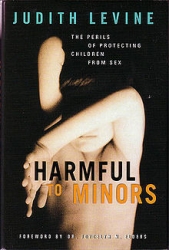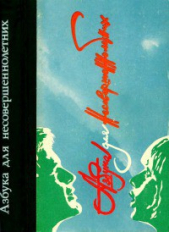Вредно для несовершеннолетних (ЛП)

Вредно для несовершеннолетних (ЛП) читать книгу онлайн
Перевод великолепной (и знаменитой) книги Джудит Левин (Judith Levine) с предисловием бывшего главного врача США (Surgeon General) Джойслин Элдерс
Внимание! Книга может содержать контент только для совершеннолетних. Для несовершеннолетних чтение данного контента СТРОГО ЗАПРЕЩЕНО! Если в книге присутствует наличие пропаганды ЛГБТ и другого, запрещенного контента - просьба написать на почту [email protected] для удаления материала
22. Anne C. Bernstein, Flight of the Stork: What Children Think (and When) about Sex and Family Building, rev. ed. (Indianapolis: Perspectives Press, 1994), 31.
23. Elizabeth Kolbert, "Americans Despair of Popular Culture," New York Times, August 20, 1995, 23.
24. Marjorie Heins, INDECENCY: The Great American Debate over Sex, Children, Free Speech, and Dirty Words, Andy Warhol Foundation for the Visual Arts, Monograph Paper #7, 1997, 4.
25. While the courts have often balked at censorship of books and films, because presumably a child could be kept from seeing them, they have upheld "safe-harbor" restrictions in numerous cases involving radio and television broadcasting. A landmark decision came in 1978, when the New York listener-supported Pacifica radio station WBAI aired the comedian George Carlin's baroque exegesis of the "Seven Filthy Words" that the Federal Communications Commission prohibited from the airwaves: shit, piss, fuck, cunt, cocksucker, motherfucker, and tits. The FCC imposed sanctions on Pacifica, which appealed the decision to the Supreme Court. There, the justices ruled that the FCC could punish Pacifica, not because the content was legally obscene, but because it broadcast the words at a time when minors were likely to be listening. Heins, INDECENCY, 11.
26. Barbara Miner, "Internet Filtering: Beware the Cybercensors," Rethinking Schools (summer 1998): 11.
27. Butler v. Michigan, 352 U.S. 383-84 (1957).
28. Janelle Brown, "Another Defeat for 'Kiddie Porn' Law," salon.com, June 23, 2000.
29. Report of the Commission on Obscenity and Pornography (Washington, D.C.: Lockhart commission, 1970), 23-27.
30. Mary R. Murrin and D. R. Laws, "The Influence of Pornography on Sexual Crimes," in Handbook of Sexual Assault, ed. W. L. Marshall, D. R. Laws, and H. E. Barbaree (New York: Plenum Press, 1990), 83-84.
31. David E. Nutter and Mary E. Kearns, "Patterns of Exposure to Sexually Explicit Material among Sex Offenders, Child Molesters, and Controls," Journal of Sex and Marital Therapy 19 (spring 1993): 73-85.
32. See John Money, Love Maps: Clinical Concepts of Sexual/Erotic Health and Pathology, Paraphilia and Gender Transposition, Childhood, Adolescence and Maturity (New York: Irving Publishers, 1986); Irene Diamond, "Pornography and Repression: A Reconsideration," Signs (summer 1989): 689; David Futrelle, "Shameful Pleasures," In These Times (March 7, 1994): 17.
33. Marjorie Heins, Sex, Sin, and Blasphemy: A Guide to America's Censorship Wars (New York: New Press, 1993).
34. Edward de Grazia, Girls Lean Back Everywhere: The Law of Obscenity and the Assault on Genius (New York: Vintage Books, 1993): 541n, 551-61.
35. U.S. Department of Justice, Report of the Surgeon General's Workshop on Pornography and Public Health (Washington, D.C.: Government Printing Office, 1986), 344.
36. Sources in Massachusetts identify this "expert" as one who gave later-discredited testimony against day-care workers accused of "satanic ritual abuse."
37. Public Eye, CBS-TV, October 8, 1997.
38. Morning Edition, National Public Radio, September 12, 1997.
39. Declan McCullagh and Brock Meeks, "Keys to The Kingdom," Cyberwire Dispatch, cyberworks.com, July 3, 1996.
40. Steven Isaac, "Safe Cruising on the Info Highway," Focus on the Family (February 1998): 12.
41. Amy Harmon, "Parents Fear That Children Are One Click Ahead of Them," New York Times, May 3, 1999, A1.
42. Jon Katz, "The Rights of Kids in the Digital Age," Wired, July 1996. In the same spirit, Katz's cyber-news Web site, frequented by youngsters, has become journalists' main source for what kids think, and also a strong source of opposition to proposed harder Internet restrictions, following the student shootings at Columbine High in Littleton, Colorado. Two studies released in June 2001 found that most preteens and teens online can take unwanted or unsolicited online communications in their stride. Three-quarters of the youth questioned both by Crimes Against Children Research Center of the University of New Hampshire and by the Pew Internet and American Life Project said they weren't upset by posts from strangers asking to have sex or talk about it, and simply deleted or blocked them. Commented Donna Hoffman, a Vanderbilt University management professor specializing in online commerce, to the New York Times, it is "no surprise" that children might be approached by people looking for sex on the Net. "It's how children are educated to deal with these experiences that is important." Jon Schwartz, "Studies Detail Solicitation of Children for Sex Online," New York Times, June 20, 2001.
43. Report of the Surgeon General's Workshop, 36-38.
44. Penelope Leach, "Kids and Sex Talk," Redbook, October 1993, 178.
45. Neil Postman, The Disappearance of Childhood (New York: Vintage Books, 1994), 80.
46. Laura Megivern, "Net Controls Won't Block the Curious," Burlington Free Press, September 24, 1997, 2C.
47. See chapter 8 for more on good public sources of sex education.
2. Manhunt
1. This account was constructed from articles in the Boston Herald, Boston Globe, and Cambridge Chronicle between October 1997 and December 1998; also Yvonne Abraham, "Life after Death," Boston Phoenix, September 25, 1998, 23-30; and interviews with Boston and Cambridge residents.
2. In spite of the proliferating coverage of pedophilia and child abuse, the media frequently claim that we are inexcusably silent on the subject. "[The pedophile] is protected not only by our ignorance of his presence, but also by our unwillingness to confront the truth," Andrew Vachss, one of the more sensationalist writers on the subject, opined in 1989, for instance.
3. Paul Okami and Amy Goldberg, "Personality Correlates of Pedophilia: Are They Reliable Indicators?" Journal of Sex Research 29, no. 3 (August 1992): 297-328; author's review of state laws.
4. See, e.g., Andrew Vachss, "How We Can Fight Child Abuse," Parade Magazine, August 20, 1989, 14.
5. A pedophile is defined as a person who has "recurrent intense sexual urges and arousing sexual fantasies involving sexual activity with a prepubescent child or children." Diagnostic and Statistical Manual of Mental Disorders III-R (Washington, D.C.: American Psychiatric Association, 1987).
6. Mike Smith, "Sex Offender Registry OK'd," Journal Gazette (Fort Wayne, Indiana), February 20, 1996.
7. Ann Landers, "There's One Cure for Child Molesters," syndicated column, August 2, 1995.
8. Debbie Nathan and Michael Snedeker, Satan's Silence: Ritual Abuse and the Making of a Modern American Witch Hunt (New York: Basic Books, 1996), 91.
9. Tim LaHaye and Beverly LaHaye, Against the Tide: How to Raise Sexually Pure Kids in an "Anything-Goes" World (Colorado Springs: Multnomah Books, 1993), 189.
10. "Improving Investigations and Protecting Victims," Boston Herald, May 4, 1994.
11. Richard Laliberte, "Missing Children: The Truth, the Hype, and What You Must Know," Redbook, February 1998, 77.
12. The death-penalty bill was defeated by one vote at the end of the 1997-98 legislative session, though the incoming Republican governor, Paul Cellucci, promised to pass it in the next term. Bob Curley, feeling used by his political handlers and used up by a life of rage, has retreated to crusade against child pornography and raise funds for child-abuse prevention programs. Abraham, "Life after Death," 30. In 2000, the Curleys brought a civil suit against the North American Man/Boy Love Association and several individuals allegedly associated with it, claiming that Jaynes was a heterosexual before reading the organization's propaganda and that his crimes were "a direct and proximate result of [its] urging, advocacy, and promoting of pedophile activity." Barbara Curley and Robert Curley v. North American Man Boy Love Association, Best Interest Communications Inc., Verio Inc. [and various individual defendants], U.S. District of Massachusetts (announced April 15, 2000). In April 2001, the family's lawyers filed additional charges against NAMBLA, seeking damages under the Racketeer Influenced and Corrupt Organizations Act (RICO), usually used to prosecute gangsters. The Massachusetts Chapter of the ACLU is representing NAMBLA on free-speech grounds; the Civil Liberties Union has asked the judge to dismiss the case. David Weber, "Family of Slain Cambridge Boy Wants NAMBLA Held Responsible," BostonHerald.com, April 11, 2001.
![Вредно для здоровья [СИ]](/uploads/posts/books/no-cover.jpg)

























